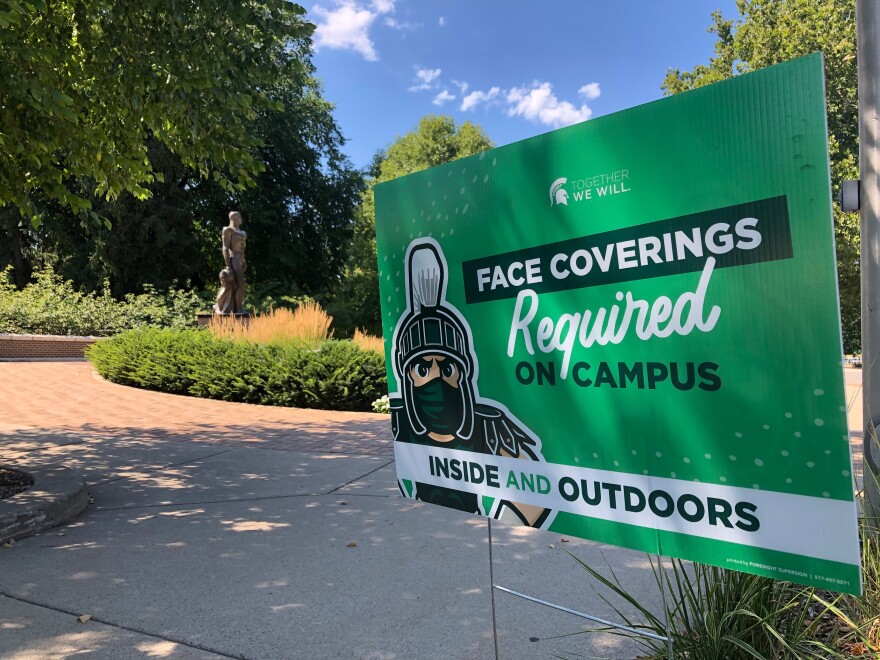Kiara Zarate was 13 hours from home when she got the email telling her MSU's Fall Semester was pivoting to remote learning. Using the last of her parents' money, she carried on to East Lansing with no concrete housing plans.
Reportaje disponible en español aqui | Hijos De Trabajadores Agricolas Se Enfrentan A Dificultades De Vivienda Cuando MSU Movio Clases En Linea
When news broke that Michigan State University was essentially closing campus to undergraduate students this semester, children of migrant workers planning to attend school had less than two weeks to figure out where they would live.
In mid-August Kiara Zarate was at a rest stop in Arkansas, 13 hours away from home, when she opened an email from Michigan State University President Samuel Stanley Jr. The university had announced that due to safety concerns over the spread of COVID-19, the majority of undergraduate classes would pivot to remote instruction and most on-campus housing would be closed. Zarate was on her way to East Lansing from Texas for her first semester of college.
“Panic and fear set in because first I was driving across the country by myself and now I had to make a quick change of plans because I was planning on living in the dorm house here at Michigan State,” she said.
At the time Zarate was not able to reach her parents.
“My parents were at work, they are working in Wisconsin because they are migrant farm workers, and they work 15 hour shifts.” she explained. “So I couldn’t talk to them, I couldn’t call them.”
She was on her own to figure out whether she should keep driving to Michigan or go back home.
“Getting up here without having a place to stay felt really bad and really ugly,” Zarate said. “So I decided to keep going only because my parents had used the last of their money to help me get up here.”
Zarate is in the MSU College Assistance Migrant Program, or CAMP, which supports children of migrant farm workers through college. Elias Lopez, the Associate Director of the program said with the closure of campus some of the biggest challenges students in the program face are financial stress and additional family responsibilities.
“Do they have access to reliable internet? Do they have access to reliable safe housing?” he shared. “If they do have safe housing, do they have housing that can accommodate a space for them to focus and study?”
That was the case for Alondra Torres. She’s a third-year student who also participates in the CAMP program, which assists her with a stipend. Torres signed a lease in East Lansing for the fall semester before the pandemic began. She said staying at her family home in Florida would have meant maneuvering remote learning while taking care of her elderly parents.
“I have to make sure that I am keeping everything safe and my parents aren’t allowed to go out because they are older so I am usually the one who has to leave to go get anything that they need from the store or any necessities they might need,” she said.
Because Torres knew she wouldn’t be as successful learning from home, she decided to move to East Lansing. Her siblings agreed to take care of her parents.
While housing options were limited for the two students, school officials say they are committed to providing on campus housing for those who need it. But they can only accommodate fewer than 2000 students. According to Lopez, students from the program are prioritized for on-campus housing.
“Michigan State University wants to make available their residential spaces to the students that need it the most and so our students definitely will fit that requirement,” he explained.
Ultimately, 3 students from the CAMP program were accommodated to live on campus, according to Lopez. In a normal semester, 80% of the nearly 300 students in the program live on campus.
After couch-surfing for a few weeks, Zarate signed a short-term lease with her cousin in an East Lansing apartment. She’s learning to juggle college for the first time while also living through a pandemic.
As for Torres, she followed through with the lease she signed earlier this year but is struggling to pay rent. She said she’s having a hard time finding a job that fits her school schedule.





